Organizational Culture, Power and Motivation Report: 4Com plc
VerifiedAdded on 2020/10/05
|16
|5002
|234
Report
AI Summary
This report examines organizational behaviour within 4Com plc, a telecommunications company. It begins by exploring the influence of organizational culture, politics, and power on individual and team performance, referencing Handy's typology of organizational culture, and discussing the positive and negative impacts of workplace politics. The report then delves into content and process theories of motivation, including Maslow's hierarchy of needs and goal-setting theory, along with practical motivational techniques. Furthermore, the report compares effective and ineffective teams and concludes with a discussion of key concepts and philosophies of organizational behaviour, providing a comprehensive overview of how these factors impact the company's operations and employee performance. The report aims to provide insights into how 4Com plc can optimize its organizational structure and practices to improve employee engagement and achieve its business objectives.
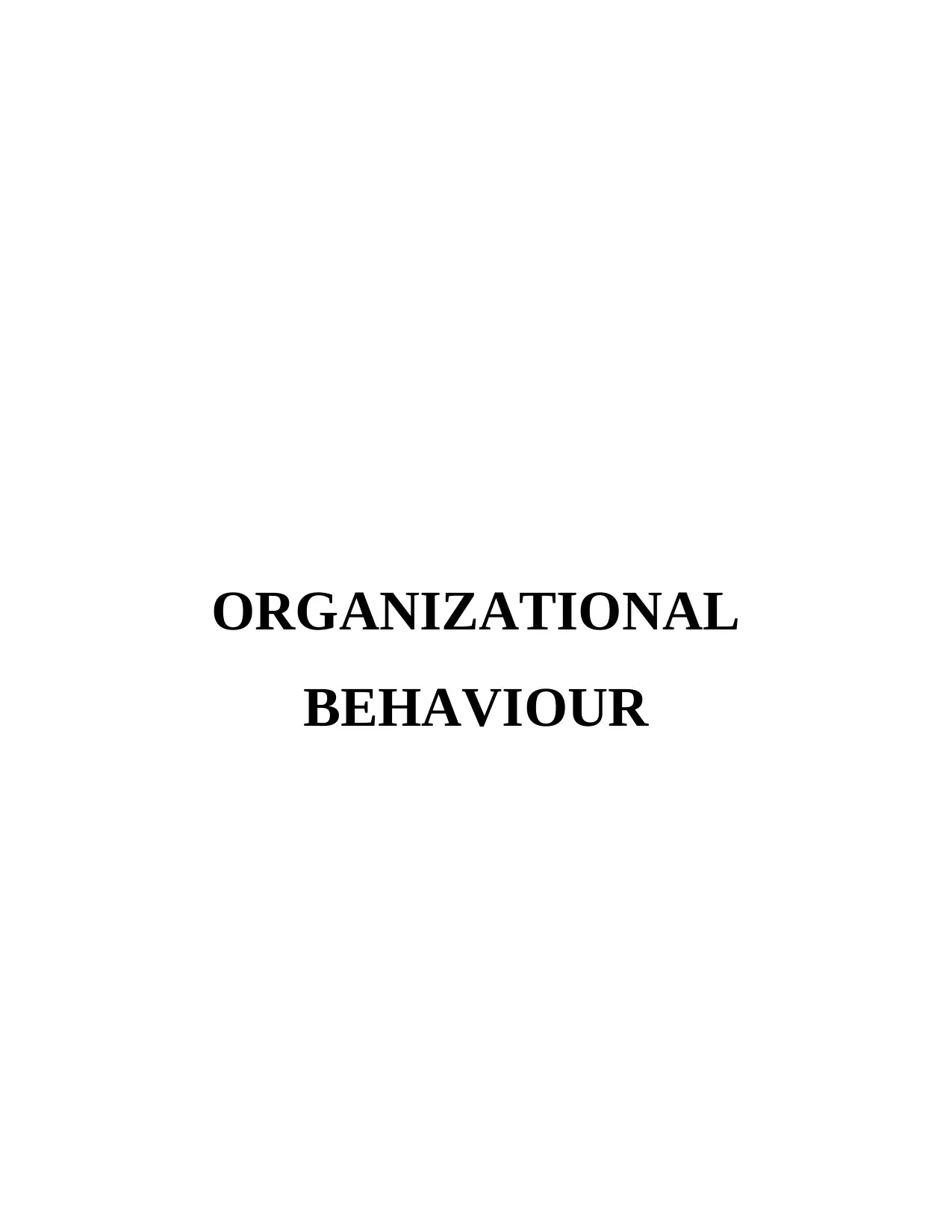
ORGANIZATIONAL
BEHAVIOUR
BEHAVIOUR
Paraphrase This Document
Need a fresh take? Get an instant paraphrase of this document with our AI Paraphraser
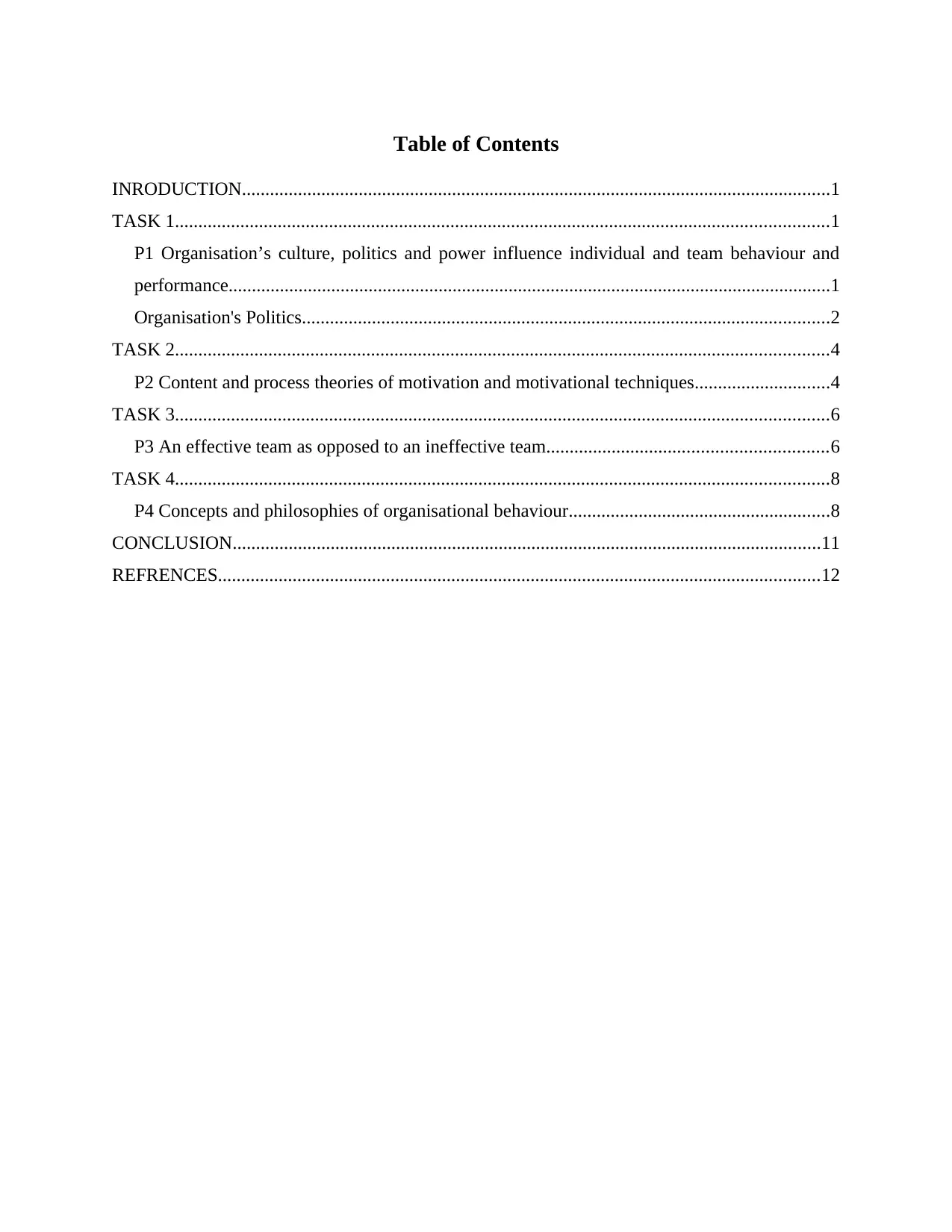
Table of Contents
INRODUCTION..............................................................................................................................1
TASK 1............................................................................................................................................1
P1 Organisation’s culture, politics and power influence individual and team behaviour and
performance.................................................................................................................................1
Organisation's Politics.................................................................................................................2
TASK 2............................................................................................................................................4
P2 Content and process theories of motivation and motivational techniques.............................4
TASK 3............................................................................................................................................6
P3 An effective team as opposed to an ineffective team............................................................6
TASK 4............................................................................................................................................8
P4 Concepts and philosophies of organisational behaviour........................................................8
CONCLUSION..............................................................................................................................11
REFRENCES.................................................................................................................................12
INRODUCTION..............................................................................................................................1
TASK 1............................................................................................................................................1
P1 Organisation’s culture, politics and power influence individual and team behaviour and
performance.................................................................................................................................1
Organisation's Politics.................................................................................................................2
TASK 2............................................................................................................................................4
P2 Content and process theories of motivation and motivational techniques.............................4
TASK 3............................................................................................................................................6
P3 An effective team as opposed to an ineffective team............................................................6
TASK 4............................................................................................................................................8
P4 Concepts and philosophies of organisational behaviour........................................................8
CONCLUSION..............................................................................................................................11
REFRENCES.................................................................................................................................12
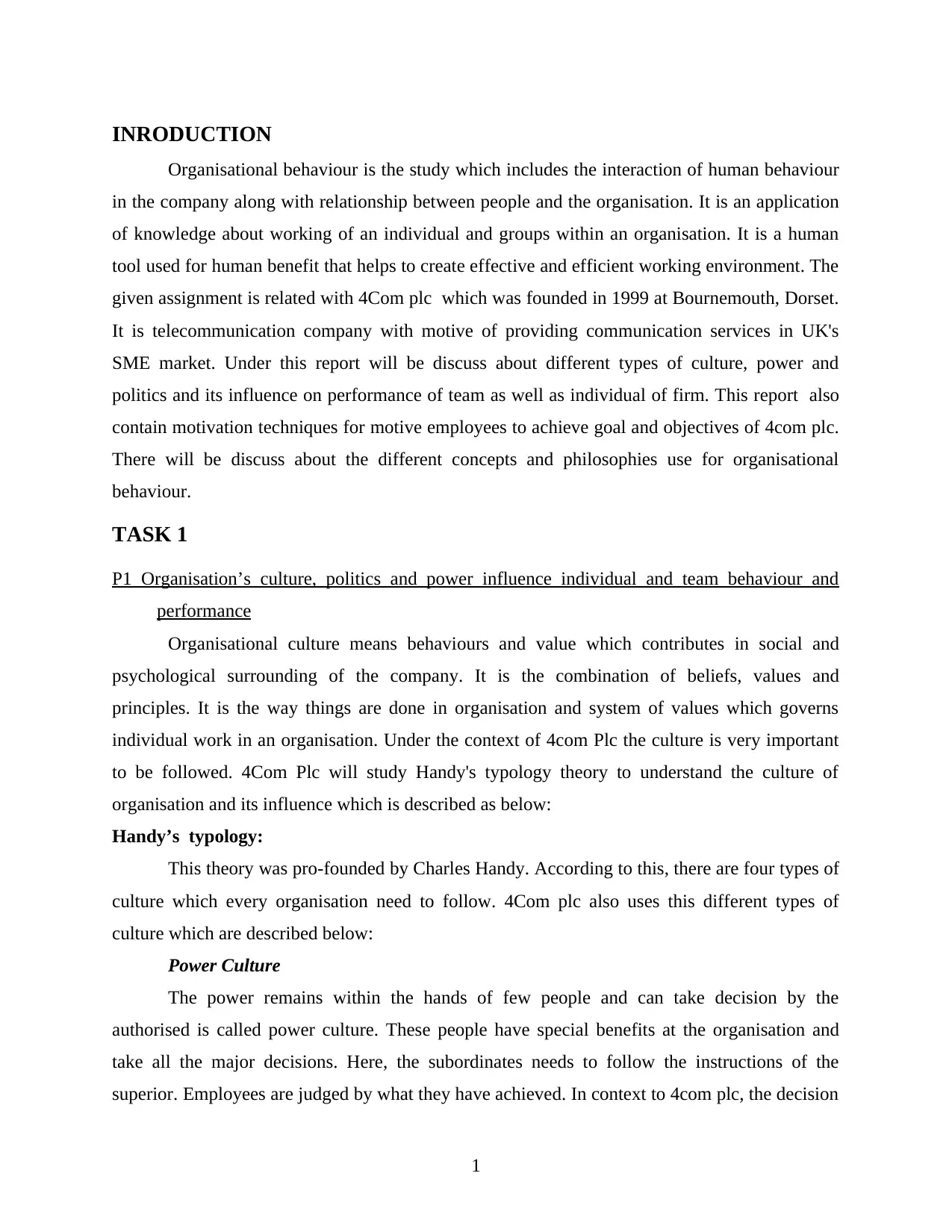
INRODUCTION
Organisational behaviour is the study which includes the interaction of human behaviour
in the company along with relationship between people and the organisation. It is an application
of knowledge about working of an individual and groups within an organisation. It is a human
tool used for human benefit that helps to create effective and efficient working environment. The
given assignment is related with 4Com plc which was founded in 1999 at Bournemouth, Dorset.
It is telecommunication company with motive of providing communication services in UK's
SME market. Under this report will be discuss about different types of culture, power and
politics and its influence on performance of team as well as individual of firm. This report also
contain motivation techniques for motive employees to achieve goal and objectives of 4com plc.
There will be discuss about the different concepts and philosophies use for organisational
behaviour.
TASK 1
P1 Organisation’s culture, politics and power influence individual and team behaviour and
performance
Organisational culture means behaviours and value which contributes in social and
psychological surrounding of the company. It is the combination of beliefs, values and
principles. It is the way things are done in organisation and system of values which governs
individual work in an organisation. Under the context of 4com Plc the culture is very important
to be followed. 4Com Plc will study Handy's typology theory to understand the culture of
organisation and its influence which is described as below:
Handy’s typology:
This theory was pro-founded by Charles Handy. According to this, there are four types of
culture which every organisation need to follow. 4Com plc also uses this different types of
culture which are described below:
Power Culture
The power remains within the hands of few people and can take decision by the
authorised is called power culture. These people have special benefits at the organisation and
take all the major decisions. Here, the subordinates needs to follow the instructions of the
superior. Employees are judged by what they have achieved. In context to 4com plc, the decision
1
Organisational behaviour is the study which includes the interaction of human behaviour
in the company along with relationship between people and the organisation. It is an application
of knowledge about working of an individual and groups within an organisation. It is a human
tool used for human benefit that helps to create effective and efficient working environment. The
given assignment is related with 4Com plc which was founded in 1999 at Bournemouth, Dorset.
It is telecommunication company with motive of providing communication services in UK's
SME market. Under this report will be discuss about different types of culture, power and
politics and its influence on performance of team as well as individual of firm. This report also
contain motivation techniques for motive employees to achieve goal and objectives of 4com plc.
There will be discuss about the different concepts and philosophies use for organisational
behaviour.
TASK 1
P1 Organisation’s culture, politics and power influence individual and team behaviour and
performance
Organisational culture means behaviours and value which contributes in social and
psychological surrounding of the company. It is the combination of beliefs, values and
principles. It is the way things are done in organisation and system of values which governs
individual work in an organisation. Under the context of 4com Plc the culture is very important
to be followed. 4Com Plc will study Handy's typology theory to understand the culture of
organisation and its influence which is described as below:
Handy’s typology:
This theory was pro-founded by Charles Handy. According to this, there are four types of
culture which every organisation need to follow. 4Com plc also uses this different types of
culture which are described below:
Power Culture
The power remains within the hands of few people and can take decision by the
authorised is called power culture. These people have special benefits at the organisation and
take all the major decisions. Here, the subordinates needs to follow the instructions of the
superior. Employees are judged by what they have achieved. In context to 4com plc, the decision
1
⊘ This is a preview!⊘
Do you want full access?
Subscribe today to unlock all pages.

Trusted by 1+ million students worldwide
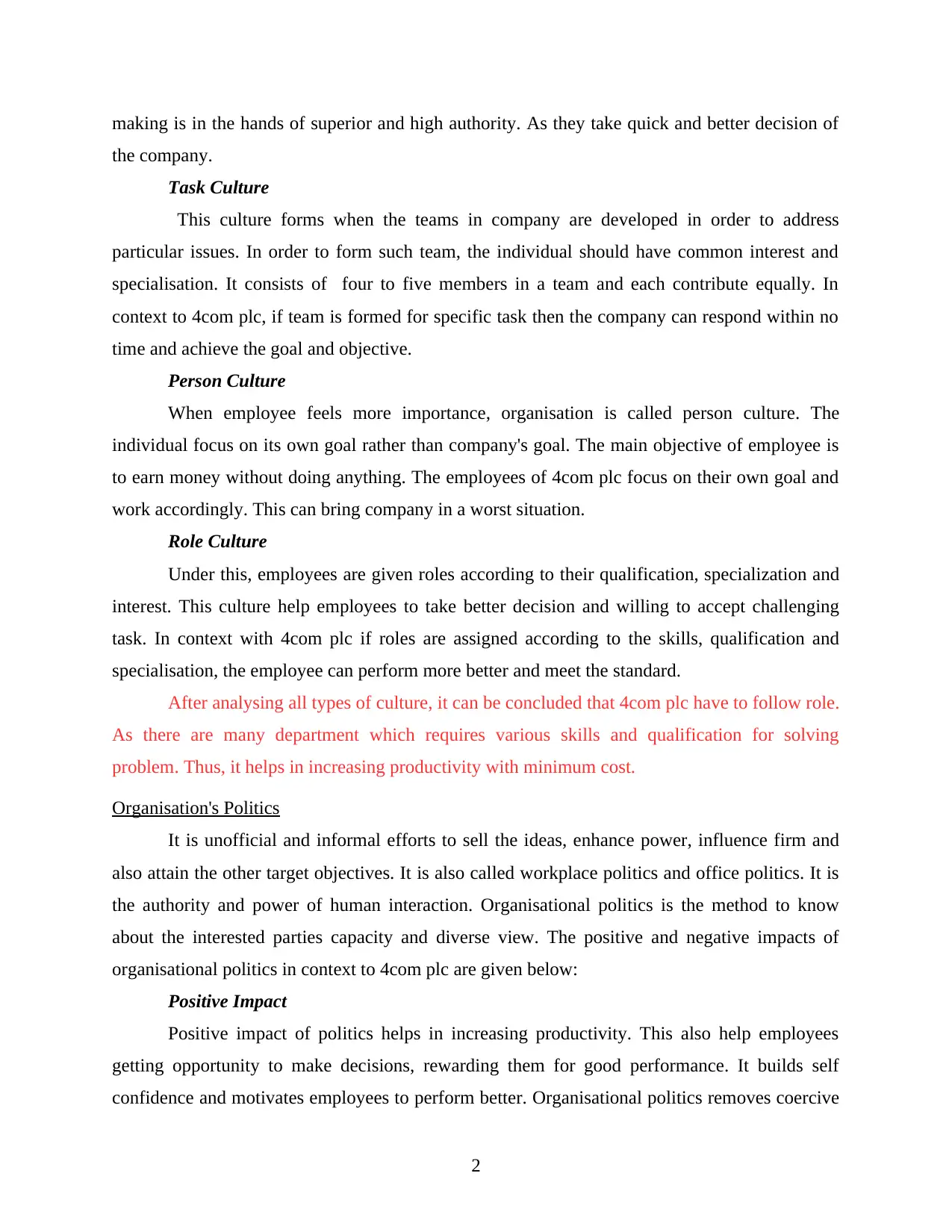
making is in the hands of superior and high authority. As they take quick and better decision of
the company.
Task Culture
This culture forms when the teams in company are developed in order to address
particular issues. In order to form such team, the individual should have common interest and
specialisation. It consists of four to five members in a team and each contribute equally. In
context to 4com plc, if team is formed for specific task then the company can respond within no
time and achieve the goal and objective.
Person Culture
When employee feels more importance, organisation is called person culture. The
individual focus on its own goal rather than company's goal. The main objective of employee is
to earn money without doing anything. The employees of 4com plc focus on their own goal and
work accordingly. This can bring company in a worst situation.
Role Culture
Under this, employees are given roles according to their qualification, specialization and
interest. This culture help employees to take better decision and willing to accept challenging
task. In context with 4com plc if roles are assigned according to the skills, qualification and
specialisation, the employee can perform more better and meet the standard.
After analysing all types of culture, it can be concluded that 4com plc have to follow role.
As there are many department which requires various skills and qualification for solving
problem. Thus, it helps in increasing productivity with minimum cost.
Organisation's Politics
It is unofficial and informal efforts to sell the ideas, enhance power, influence firm and
also attain the other target objectives. It is also called workplace politics and office politics. It is
the authority and power of human interaction. Organisational politics is the method to know
about the interested parties capacity and diverse view. The positive and negative impacts of
organisational politics in context to 4com plc are given below:
Positive Impact
Positive impact of politics helps in increasing productivity. This also help employees
getting opportunity to make decisions, rewarding them for good performance. It builds self
confidence and motivates employees to perform better. Organisational politics removes coercive
2
the company.
Task Culture
This culture forms when the teams in company are developed in order to address
particular issues. In order to form such team, the individual should have common interest and
specialisation. It consists of four to five members in a team and each contribute equally. In
context to 4com plc, if team is formed for specific task then the company can respond within no
time and achieve the goal and objective.
Person Culture
When employee feels more importance, organisation is called person culture. The
individual focus on its own goal rather than company's goal. The main objective of employee is
to earn money without doing anything. The employees of 4com plc focus on their own goal and
work accordingly. This can bring company in a worst situation.
Role Culture
Under this, employees are given roles according to their qualification, specialization and
interest. This culture help employees to take better decision and willing to accept challenging
task. In context with 4com plc if roles are assigned according to the skills, qualification and
specialisation, the employee can perform more better and meet the standard.
After analysing all types of culture, it can be concluded that 4com plc have to follow role.
As there are many department which requires various skills and qualification for solving
problem. Thus, it helps in increasing productivity with minimum cost.
Organisation's Politics
It is unofficial and informal efforts to sell the ideas, enhance power, influence firm and
also attain the other target objectives. It is also called workplace politics and office politics. It is
the authority and power of human interaction. Organisational politics is the method to know
about the interested parties capacity and diverse view. The positive and negative impacts of
organisational politics in context to 4com plc are given below:
Positive Impact
Positive impact of politics helps in increasing productivity. This also help employees
getting opportunity to make decisions, rewarding them for good performance. It builds self
confidence and motivates employees to perform better. Organisational politics removes coercive
2
Paraphrase This Document
Need a fresh take? Get an instant paraphrase of this document with our AI Paraphraser
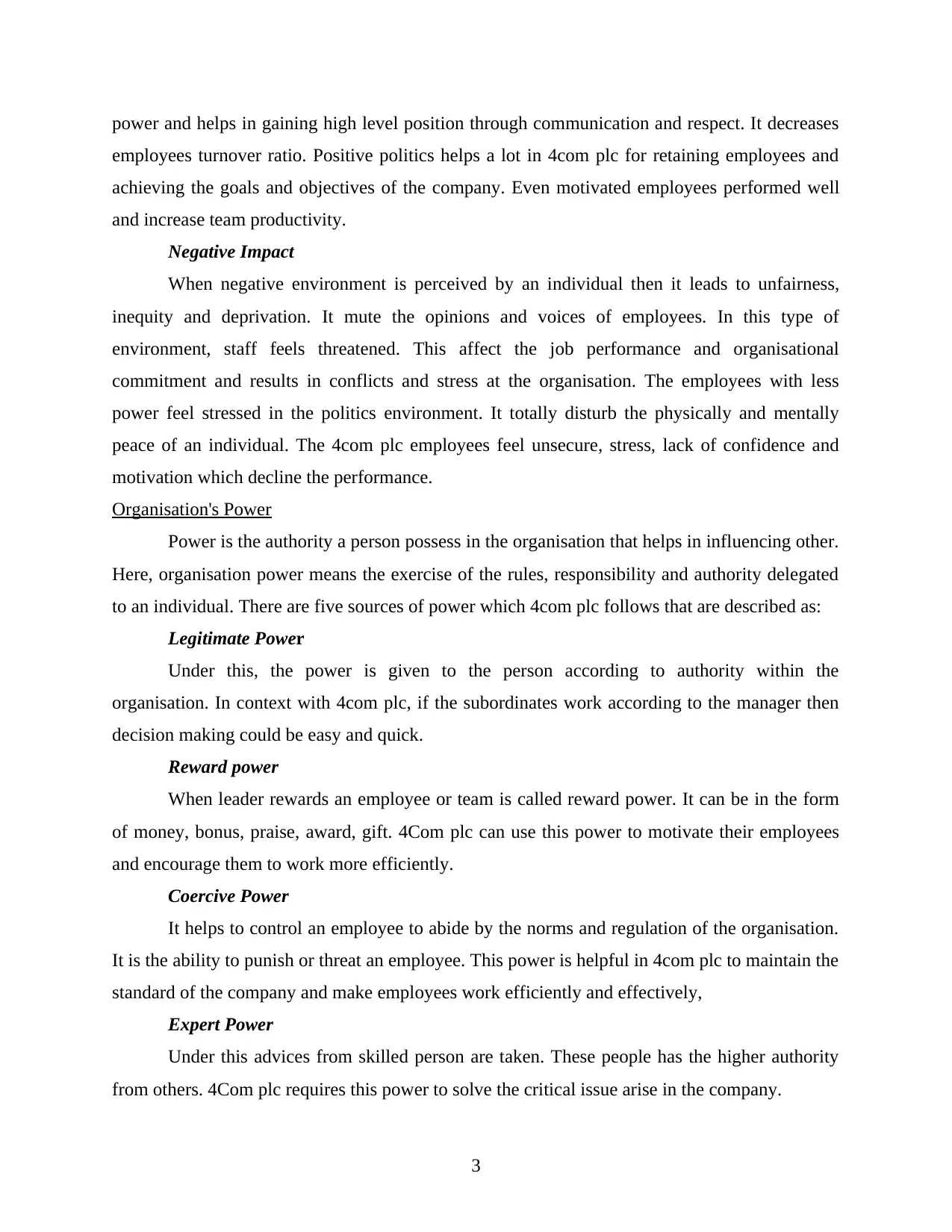
power and helps in gaining high level position through communication and respect. It decreases
employees turnover ratio. Positive politics helps a lot in 4com plc for retaining employees and
achieving the goals and objectives of the company. Even motivated employees performed well
and increase team productivity.
Negative Impact
When negative environment is perceived by an individual then it leads to unfairness,
inequity and deprivation. It mute the opinions and voices of employees. In this type of
environment, staff feels threatened. This affect the job performance and organisational
commitment and results in conflicts and stress at the organisation. The employees with less
power feel stressed in the politics environment. It totally disturb the physically and mentally
peace of an individual. The 4com plc employees feel unsecure, stress, lack of confidence and
motivation which decline the performance.
Organisation's Power
Power is the authority a person possess in the organisation that helps in influencing other.
Here, organisation power means the exercise of the rules, responsibility and authority delegated
to an individual. There are five sources of power which 4com plc follows that are described as:
Legitimate Power
Under this, the power is given to the person according to authority within the
organisation. In context with 4com plc, if the subordinates work according to the manager then
decision making could be easy and quick.
Reward power
When leader rewards an employee or team is called reward power. It can be in the form
of money, bonus, praise, award, gift. 4Com plc can use this power to motivate their employees
and encourage them to work more efficiently.
Coercive Power
It helps to control an employee to abide by the norms and regulation of the organisation.
It is the ability to punish or threat an employee. This power is helpful in 4com plc to maintain the
standard of the company and make employees work efficiently and effectively,
Expert Power
Under this advices from skilled person are taken. These people has the higher authority
from others. 4Com plc requires this power to solve the critical issue arise in the company.
3
employees turnover ratio. Positive politics helps a lot in 4com plc for retaining employees and
achieving the goals and objectives of the company. Even motivated employees performed well
and increase team productivity.
Negative Impact
When negative environment is perceived by an individual then it leads to unfairness,
inequity and deprivation. It mute the opinions and voices of employees. In this type of
environment, staff feels threatened. This affect the job performance and organisational
commitment and results in conflicts and stress at the organisation. The employees with less
power feel stressed in the politics environment. It totally disturb the physically and mentally
peace of an individual. The 4com plc employees feel unsecure, stress, lack of confidence and
motivation which decline the performance.
Organisation's Power
Power is the authority a person possess in the organisation that helps in influencing other.
Here, organisation power means the exercise of the rules, responsibility and authority delegated
to an individual. There are five sources of power which 4com plc follows that are described as:
Legitimate Power
Under this, the power is given to the person according to authority within the
organisation. In context with 4com plc, if the subordinates work according to the manager then
decision making could be easy and quick.
Reward power
When leader rewards an employee or team is called reward power. It can be in the form
of money, bonus, praise, award, gift. 4Com plc can use this power to motivate their employees
and encourage them to work more efficiently.
Coercive Power
It helps to control an employee to abide by the norms and regulation of the organisation.
It is the ability to punish or threat an employee. This power is helpful in 4com plc to maintain the
standard of the company and make employees work efficiently and effectively,
Expert Power
Under this advices from skilled person are taken. These people has the higher authority
from others. 4Com plc requires this power to solve the critical issue arise in the company.
3
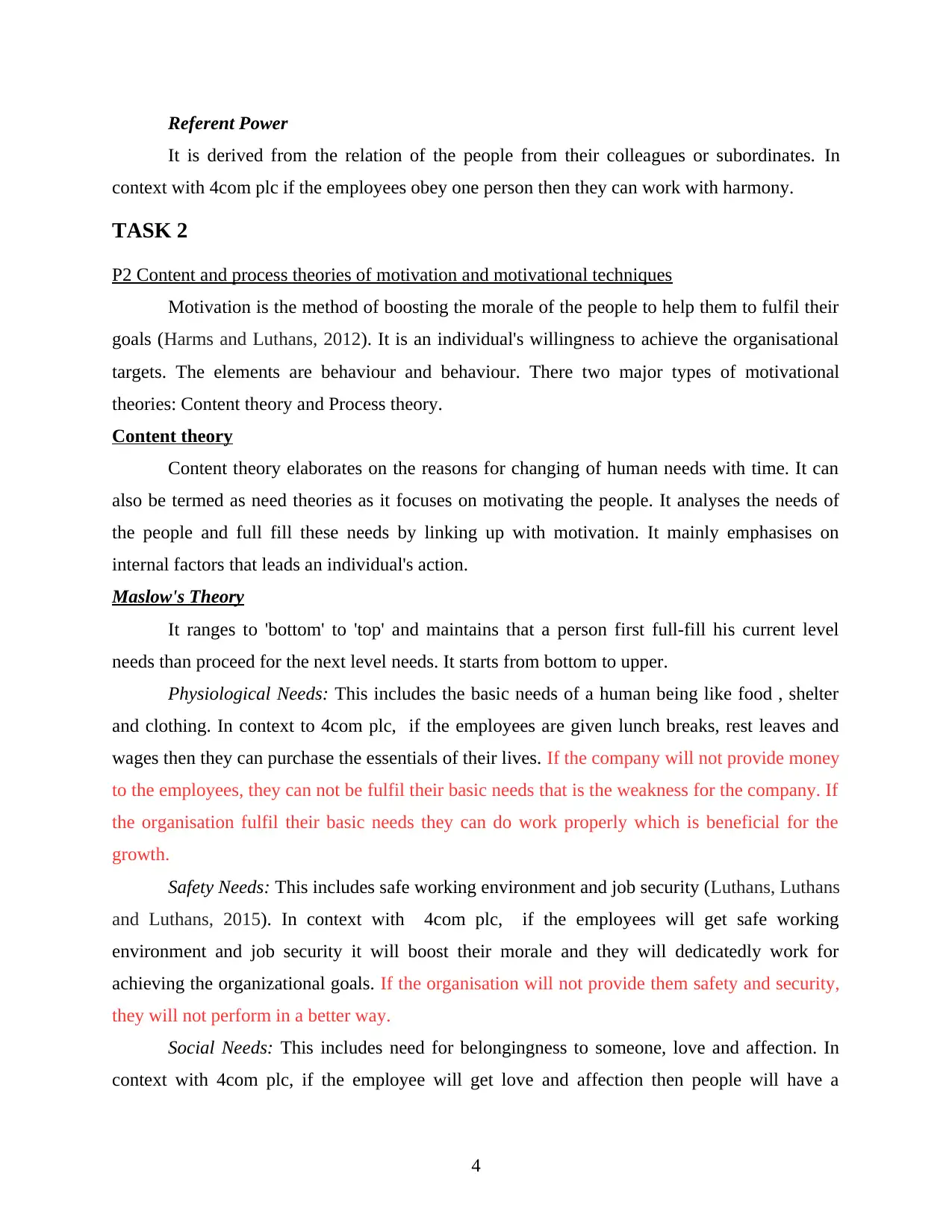
Referent Power
It is derived from the relation of the people from their colleagues or subordinates. In
context with 4com plc if the employees obey one person then they can work with harmony.
TASK 2
P2 Content and process theories of motivation and motivational techniques
Motivation is the method of boosting the morale of the people to help them to fulfil their
goals (Harms and Luthans, 2012). It is an individual's willingness to achieve the organisational
targets. The elements are behaviour and behaviour. There two major types of motivational
theories: Content theory and Process theory.
Content theory
Content theory elaborates on the reasons for changing of human needs with time. It can
also be termed as need theories as it focuses on motivating the people. It analyses the needs of
the people and full fill these needs by linking up with motivation. It mainly emphasises on
internal factors that leads an individual's action.
Maslow's Theory
It ranges to 'bottom' to 'top' and maintains that a person first full-fill his current level
needs than proceed for the next level needs. It starts from bottom to upper.
Physiological Needs: This includes the basic needs of a human being like food , shelter
and clothing. In context to 4com plc, if the employees are given lunch breaks, rest leaves and
wages then they can purchase the essentials of their lives. If the company will not provide money
to the employees, they can not be fulfil their basic needs that is the weakness for the company. If
the organisation fulfil their basic needs they can do work properly which is beneficial for the
growth.
Safety Needs: This includes safe working environment and job security (Luthans, Luthans
and Luthans, 2015). In context with 4com plc, if the employees will get safe working
environment and job security it will boost their morale and they will dedicatedly work for
achieving the organizational goals. If the organisation will not provide them safety and security,
they will not perform in a better way.
Social Needs: This includes need for belongingness to someone, love and affection. In
context with 4com plc, if the employee will get love and affection then people will have a
4
It is derived from the relation of the people from their colleagues or subordinates. In
context with 4com plc if the employees obey one person then they can work with harmony.
TASK 2
P2 Content and process theories of motivation and motivational techniques
Motivation is the method of boosting the morale of the people to help them to fulfil their
goals (Harms and Luthans, 2012). It is an individual's willingness to achieve the organisational
targets. The elements are behaviour and behaviour. There two major types of motivational
theories: Content theory and Process theory.
Content theory
Content theory elaborates on the reasons for changing of human needs with time. It can
also be termed as need theories as it focuses on motivating the people. It analyses the needs of
the people and full fill these needs by linking up with motivation. It mainly emphasises on
internal factors that leads an individual's action.
Maslow's Theory
It ranges to 'bottom' to 'top' and maintains that a person first full-fill his current level
needs than proceed for the next level needs. It starts from bottom to upper.
Physiological Needs: This includes the basic needs of a human being like food , shelter
and clothing. In context to 4com plc, if the employees are given lunch breaks, rest leaves and
wages then they can purchase the essentials of their lives. If the company will not provide money
to the employees, they can not be fulfil their basic needs that is the weakness for the company. If
the organisation fulfil their basic needs they can do work properly which is beneficial for the
growth.
Safety Needs: This includes safe working environment and job security (Luthans, Luthans
and Luthans, 2015). In context with 4com plc, if the employees will get safe working
environment and job security it will boost their morale and they will dedicatedly work for
achieving the organizational goals. If the organisation will not provide them safety and security,
they will not perform in a better way.
Social Needs: This includes need for belongingness to someone, love and affection. In
context with 4com plc, if the employee will get love and affection then people will have a
4
⊘ This is a preview!⊘
Do you want full access?
Subscribe today to unlock all pages.

Trusted by 1+ million students worldwide
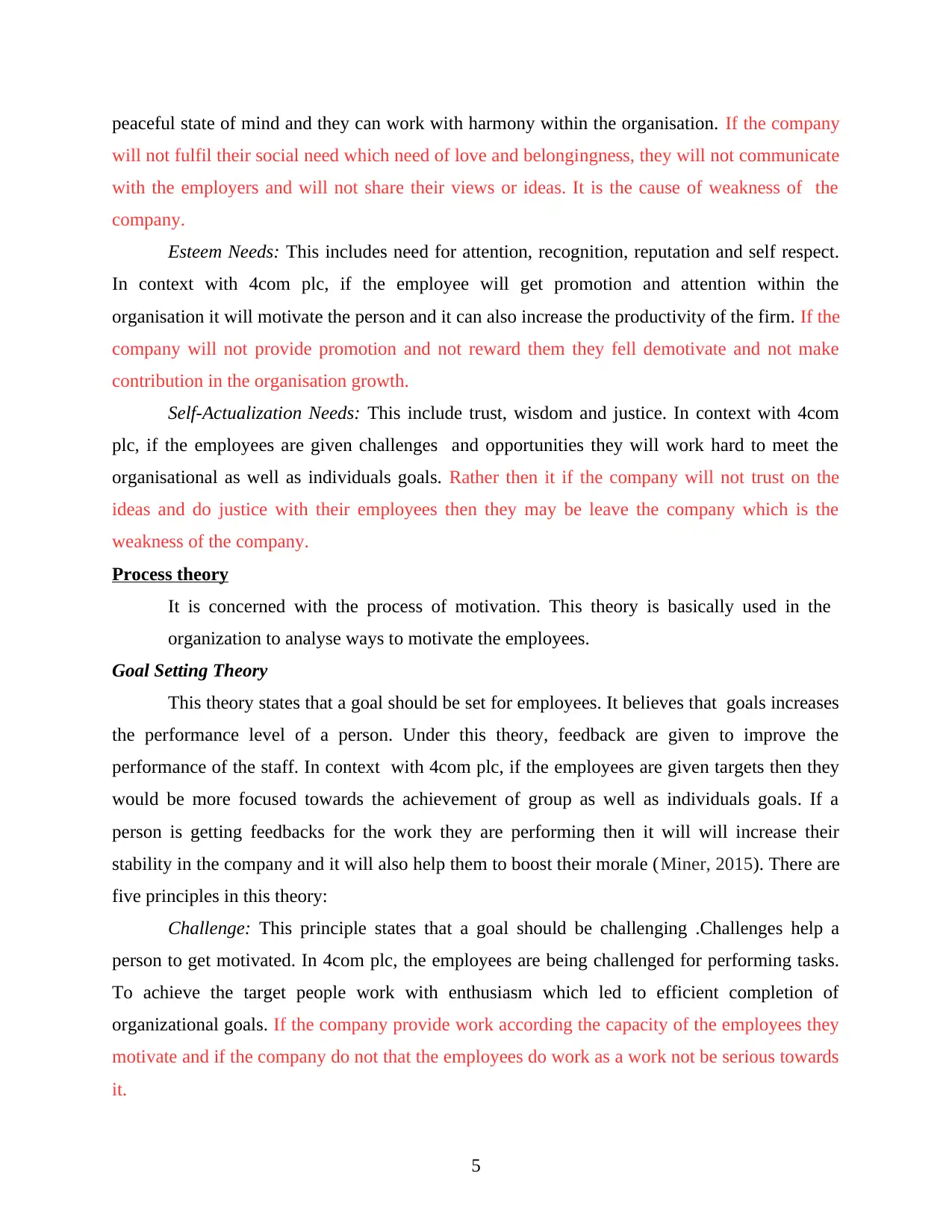
peaceful state of mind and they can work with harmony within the organisation. If the company
will not fulfil their social need which need of love and belongingness, they will not communicate
with the employers and will not share their views or ideas. It is the cause of weakness of the
company.
Esteem Needs: This includes need for attention, recognition, reputation and self respect.
In context with 4com plc, if the employee will get promotion and attention within the
organisation it will motivate the person and it can also increase the productivity of the firm. If the
company will not provide promotion and not reward them they fell demotivate and not make
contribution in the organisation growth.
Self-Actualization Needs: This include trust, wisdom and justice. In context with 4com
plc, if the employees are given challenges and opportunities they will work hard to meet the
organisational as well as individuals goals. Rather then it if the company will not trust on the
ideas and do justice with their employees then they may be leave the company which is the
weakness of the company.
Process theory
It is concerned with the process of motivation. This theory is basically used in the
organization to analyse ways to motivate the employees.
Goal Setting Theory
This theory states that a goal should be set for employees. It believes that goals increases
the performance level of a person. Under this theory, feedback are given to improve the
performance of the staff. In context with 4com plc, if the employees are given targets then they
would be more focused towards the achievement of group as well as individuals goals. If a
person is getting feedbacks for the work they are performing then it will will increase their
stability in the company and it will also help them to boost their morale (Miner, 2015). There are
five principles in this theory:
Challenge: This principle states that a goal should be challenging .Challenges help a
person to get motivated. In 4com plc, the employees are being challenged for performing tasks.
To achieve the target people work with enthusiasm which led to efficient completion of
organizational goals. If the company provide work according the capacity of the employees they
motivate and if the company do not that the employees do work as a work not be serious towards
it.
5
will not fulfil their social need which need of love and belongingness, they will not communicate
with the employers and will not share their views or ideas. It is the cause of weakness of the
company.
Esteem Needs: This includes need for attention, recognition, reputation and self respect.
In context with 4com plc, if the employee will get promotion and attention within the
organisation it will motivate the person and it can also increase the productivity of the firm. If the
company will not provide promotion and not reward them they fell demotivate and not make
contribution in the organisation growth.
Self-Actualization Needs: This include trust, wisdom and justice. In context with 4com
plc, if the employees are given challenges and opportunities they will work hard to meet the
organisational as well as individuals goals. Rather then it if the company will not trust on the
ideas and do justice with their employees then they may be leave the company which is the
weakness of the company.
Process theory
It is concerned with the process of motivation. This theory is basically used in the
organization to analyse ways to motivate the employees.
Goal Setting Theory
This theory states that a goal should be set for employees. It believes that goals increases
the performance level of a person. Under this theory, feedback are given to improve the
performance of the staff. In context with 4com plc, if the employees are given targets then they
would be more focused towards the achievement of group as well as individuals goals. If a
person is getting feedbacks for the work they are performing then it will will increase their
stability in the company and it will also help them to boost their morale (Miner, 2015). There are
five principles in this theory:
Challenge: This principle states that a goal should be challenging .Challenges help a
person to get motivated. In 4com plc, the employees are being challenged for performing tasks.
To achieve the target people work with enthusiasm which led to efficient completion of
organizational goals. If the company provide work according the capacity of the employees they
motivate and if the company do not that the employees do work as a work not be serious towards
it.
5
Paraphrase This Document
Need a fresh take? Get an instant paraphrase of this document with our AI Paraphraser
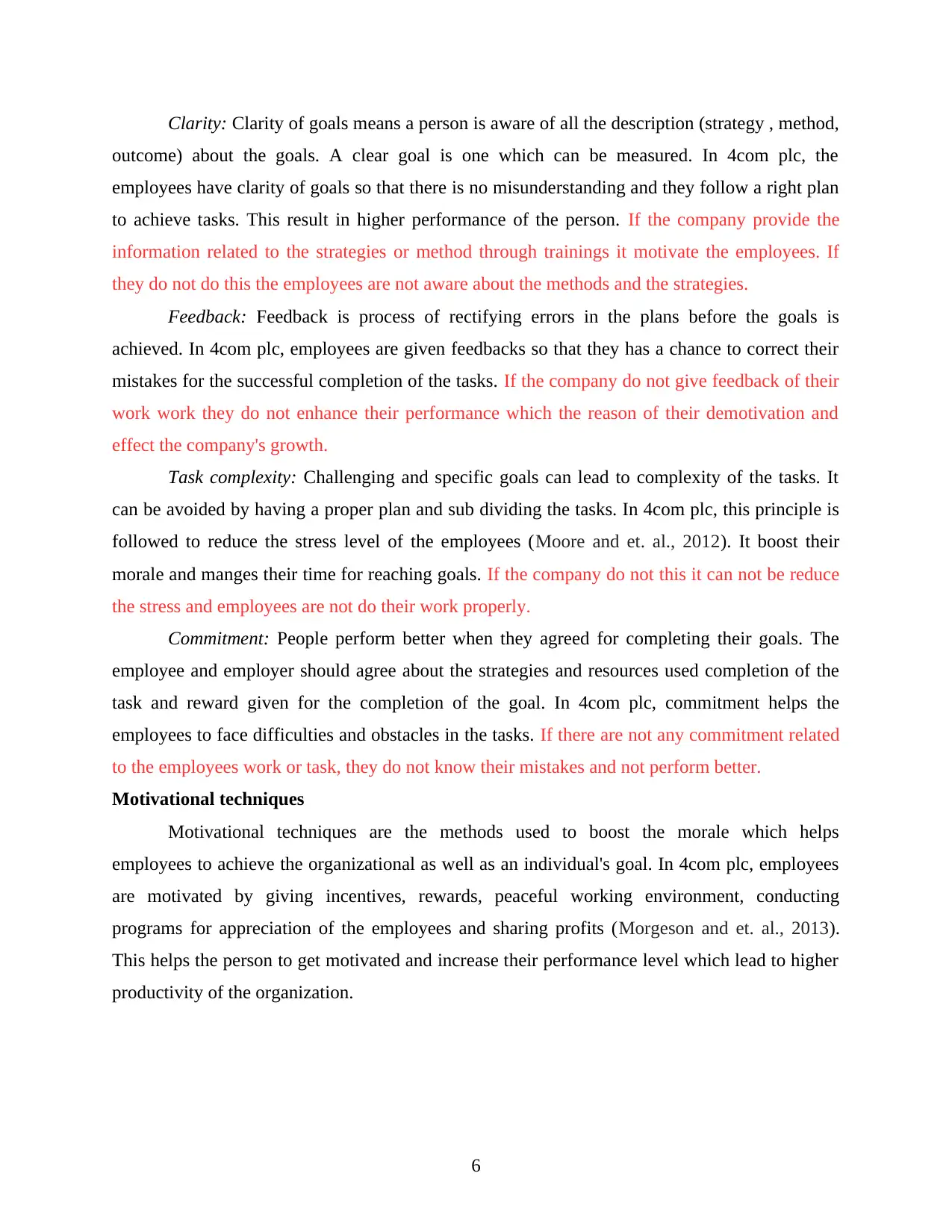
Clarity: Clarity of goals means a person is aware of all the description (strategy , method,
outcome) about the goals. A clear goal is one which can be measured. In 4com plc, the
employees have clarity of goals so that there is no misunderstanding and they follow a right plan
to achieve tasks. This result in higher performance of the person. If the company provide the
information related to the strategies or method through trainings it motivate the employees. If
they do not do this the employees are not aware about the methods and the strategies.
Feedback: Feedback is process of rectifying errors in the plans before the goals is
achieved. In 4com plc, employees are given feedbacks so that they has a chance to correct their
mistakes for the successful completion of the tasks. If the company do not give feedback of their
work work they do not enhance their performance which the reason of their demotivation and
effect the company's growth.
Task complexity: Challenging and specific goals can lead to complexity of the tasks. It
can be avoided by having a proper plan and sub dividing the tasks. In 4com plc, this principle is
followed to reduce the stress level of the employees (Moore and et. al., 2012). It boost their
morale and manges their time for reaching goals. If the company do not this it can not be reduce
the stress and employees are not do their work properly.
Commitment: People perform better when they agreed for completing their goals. The
employee and employer should agree about the strategies and resources used completion of the
task and reward given for the completion of the goal. In 4com plc, commitment helps the
employees to face difficulties and obstacles in the tasks. If there are not any commitment related
to the employees work or task, they do not know their mistakes and not perform better.
Motivational techniques
Motivational techniques are the methods used to boost the morale which helps
employees to achieve the organizational as well as an individual's goal. In 4com plc, employees
are motivated by giving incentives, rewards, peaceful working environment, conducting
programs for appreciation of the employees and sharing profits (Morgeson and et. al., 2013).
This helps the person to get motivated and increase their performance level which lead to higher
productivity of the organization.
6
outcome) about the goals. A clear goal is one which can be measured. In 4com plc, the
employees have clarity of goals so that there is no misunderstanding and they follow a right plan
to achieve tasks. This result in higher performance of the person. If the company provide the
information related to the strategies or method through trainings it motivate the employees. If
they do not do this the employees are not aware about the methods and the strategies.
Feedback: Feedback is process of rectifying errors in the plans before the goals is
achieved. In 4com plc, employees are given feedbacks so that they has a chance to correct their
mistakes for the successful completion of the tasks. If the company do not give feedback of their
work work they do not enhance their performance which the reason of their demotivation and
effect the company's growth.
Task complexity: Challenging and specific goals can lead to complexity of the tasks. It
can be avoided by having a proper plan and sub dividing the tasks. In 4com plc, this principle is
followed to reduce the stress level of the employees (Moore and et. al., 2012). It boost their
morale and manges their time for reaching goals. If the company do not this it can not be reduce
the stress and employees are not do their work properly.
Commitment: People perform better when they agreed for completing their goals. The
employee and employer should agree about the strategies and resources used completion of the
task and reward given for the completion of the goal. In 4com plc, commitment helps the
employees to face difficulties and obstacles in the tasks. If there are not any commitment related
to the employees work or task, they do not know their mistakes and not perform better.
Motivational techniques
Motivational techniques are the methods used to boost the morale which helps
employees to achieve the organizational as well as an individual's goal. In 4com plc, employees
are motivated by giving incentives, rewards, peaceful working environment, conducting
programs for appreciation of the employees and sharing profits (Morgeson and et. al., 2013).
This helps the person to get motivated and increase their performance level which lead to higher
productivity of the organization.
6
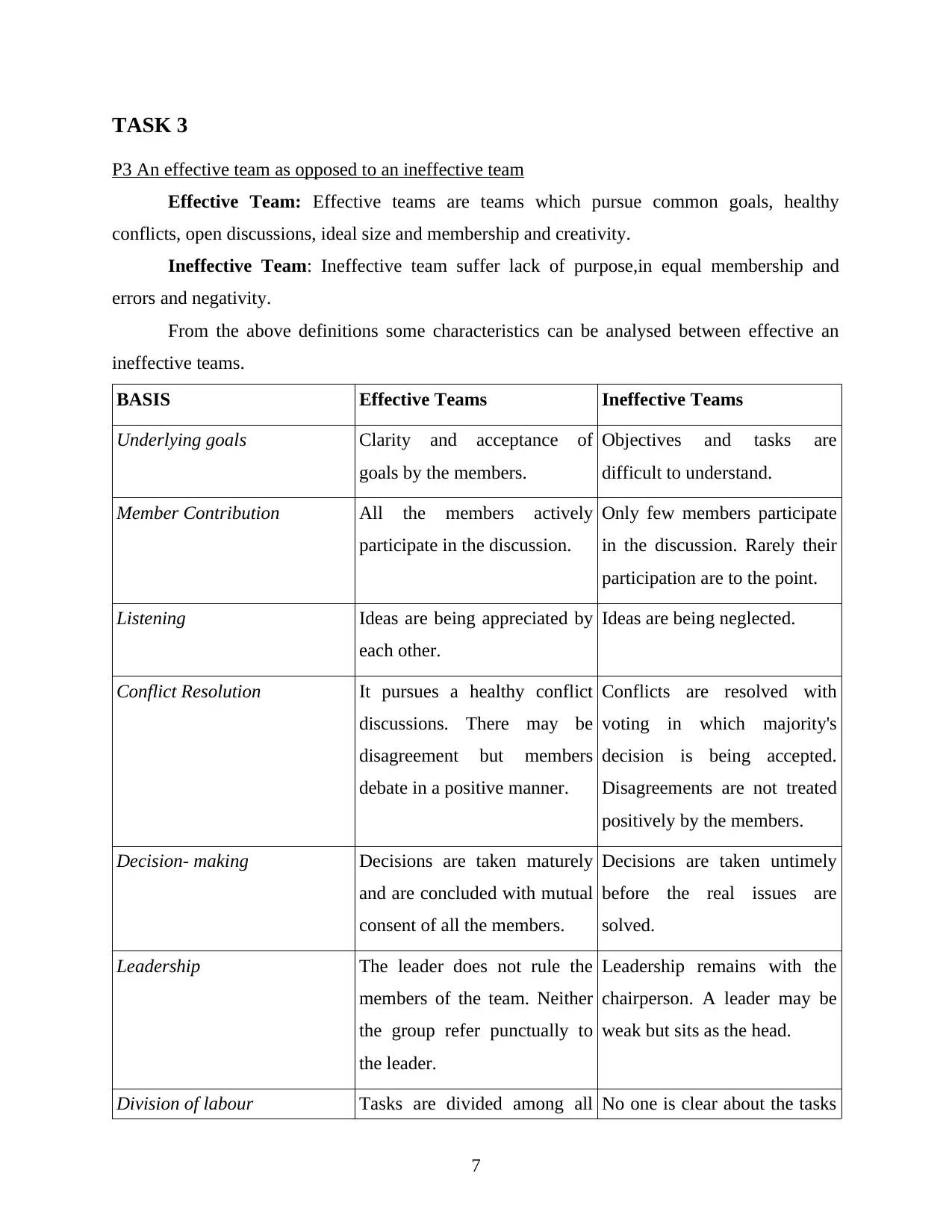
TASK 3
P3 An effective team as opposed to an ineffective team
Effective Team: Effective teams are teams which pursue common goals, healthy
conflicts, open discussions, ideal size and membership and creativity.
Ineffective Team: Ineffective team suffer lack of purpose,in equal membership and
errors and negativity.
From the above definitions some characteristics can be analysed between effective an
ineffective teams.
BASIS Effective Teams Ineffective Teams
Underlying goals Clarity and acceptance of
goals by the members.
Objectives and tasks are
difficult to understand.
Member Contribution All the members actively
participate in the discussion.
Only few members participate
in the discussion. Rarely their
participation are to the point.
Listening Ideas are being appreciated by
each other.
Ideas are being neglected.
Conflict Resolution It pursues a healthy conflict
discussions. There may be
disagreement but members
debate in a positive manner.
Conflicts are resolved with
voting in which majority's
decision is being accepted.
Disagreements are not treated
positively by the members.
Decision- making Decisions are taken maturely
and are concluded with mutual
consent of all the members.
Decisions are taken untimely
before the real issues are
solved.
Leadership The leader does not rule the
members of the team. Neither
the group refer punctually to
the leader.
Leadership remains with the
chairperson. A leader may be
weak but sits as the head.
Division of labour Tasks are divided among all No one is clear about the tasks
7
P3 An effective team as opposed to an ineffective team
Effective Team: Effective teams are teams which pursue common goals, healthy
conflicts, open discussions, ideal size and membership and creativity.
Ineffective Team: Ineffective team suffer lack of purpose,in equal membership and
errors and negativity.
From the above definitions some characteristics can be analysed between effective an
ineffective teams.
BASIS Effective Teams Ineffective Teams
Underlying goals Clarity and acceptance of
goals by the members.
Objectives and tasks are
difficult to understand.
Member Contribution All the members actively
participate in the discussion.
Only few members participate
in the discussion. Rarely their
participation are to the point.
Listening Ideas are being appreciated by
each other.
Ideas are being neglected.
Conflict Resolution It pursues a healthy conflict
discussions. There may be
disagreement but members
debate in a positive manner.
Conflicts are resolved with
voting in which majority's
decision is being accepted.
Disagreements are not treated
positively by the members.
Decision- making Decisions are taken maturely
and are concluded with mutual
consent of all the members.
Decisions are taken untimely
before the real issues are
solved.
Leadership The leader does not rule the
members of the team. Neither
the group refer punctually to
the leader.
Leadership remains with the
chairperson. A leader may be
weak but sits as the head.
Division of labour Tasks are divided among all No one is clear about the tasks
7
⊘ This is a preview!⊘
Do you want full access?
Subscribe today to unlock all pages.

Trusted by 1+ million students worldwide
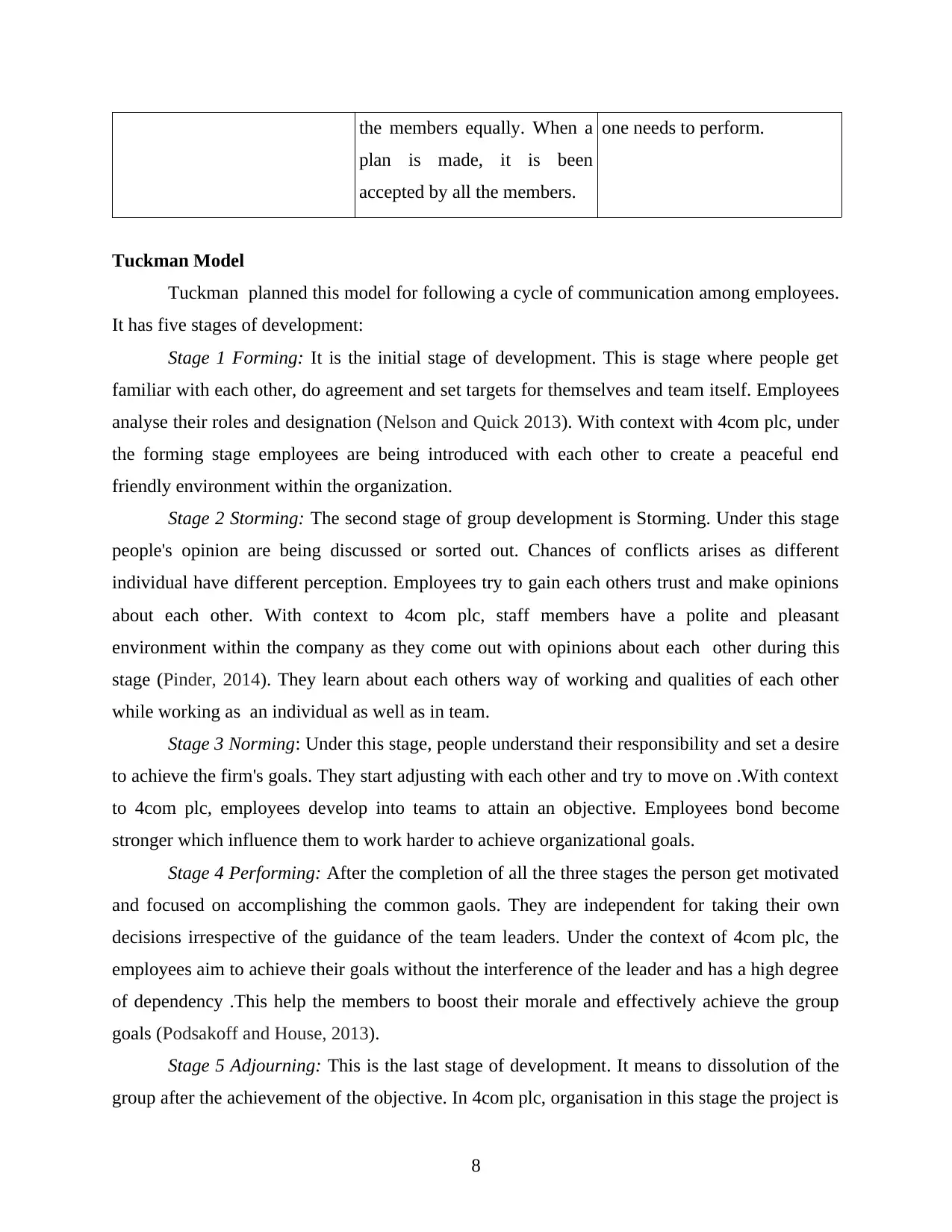
the members equally. When a
plan is made, it is been
accepted by all the members.
one needs to perform.
Tuckman Model
Tuckman planned this model for following a cycle of communication among employees.
It has five stages of development:
Stage 1 Forming: It is the initial stage of development. This is stage where people get
familiar with each other, do agreement and set targets for themselves and team itself. Employees
analyse their roles and designation (Nelson and Quick 2013). With context with 4com plc, under
the forming stage employees are being introduced with each other to create a peaceful end
friendly environment within the organization.
Stage 2 Storming: The second stage of group development is Storming. Under this stage
people's opinion are being discussed or sorted out. Chances of conflicts arises as different
individual have different perception. Employees try to gain each others trust and make opinions
about each other. With context to 4com plc, staff members have a polite and pleasant
environment within the company as they come out with opinions about each other during this
stage (Pinder, 2014). They learn about each others way of working and qualities of each other
while working as an individual as well as in team.
Stage 3 Norming: Under this stage, people understand their responsibility and set a desire
to achieve the firm's goals. They start adjusting with each other and try to move on .With context
to 4com plc, employees develop into teams to attain an objective. Employees bond become
stronger which influence them to work harder to achieve organizational goals.
Stage 4 Performing: After the completion of all the three stages the person get motivated
and focused on accomplishing the common gaols. They are independent for taking their own
decisions irrespective of the guidance of the team leaders. Under the context of 4com plc, the
employees aim to achieve their goals without the interference of the leader and has a high degree
of dependency .This help the members to boost their morale and effectively achieve the group
goals (Podsakoff and House, 2013).
Stage 5 Adjourning: This is the last stage of development. It means to dissolution of the
group after the achievement of the objective. In 4com plc, organisation in this stage the project is
8
plan is made, it is been
accepted by all the members.
one needs to perform.
Tuckman Model
Tuckman planned this model for following a cycle of communication among employees.
It has five stages of development:
Stage 1 Forming: It is the initial stage of development. This is stage where people get
familiar with each other, do agreement and set targets for themselves and team itself. Employees
analyse their roles and designation (Nelson and Quick 2013). With context with 4com plc, under
the forming stage employees are being introduced with each other to create a peaceful end
friendly environment within the organization.
Stage 2 Storming: The second stage of group development is Storming. Under this stage
people's opinion are being discussed or sorted out. Chances of conflicts arises as different
individual have different perception. Employees try to gain each others trust and make opinions
about each other. With context to 4com plc, staff members have a polite and pleasant
environment within the company as they come out with opinions about each other during this
stage (Pinder, 2014). They learn about each others way of working and qualities of each other
while working as an individual as well as in team.
Stage 3 Norming: Under this stage, people understand their responsibility and set a desire
to achieve the firm's goals. They start adjusting with each other and try to move on .With context
to 4com plc, employees develop into teams to attain an objective. Employees bond become
stronger which influence them to work harder to achieve organizational goals.
Stage 4 Performing: After the completion of all the three stages the person get motivated
and focused on accomplishing the common gaols. They are independent for taking their own
decisions irrespective of the guidance of the team leaders. Under the context of 4com plc, the
employees aim to achieve their goals without the interference of the leader and has a high degree
of dependency .This help the members to boost their morale and effectively achieve the group
goals (Podsakoff and House, 2013).
Stage 5 Adjourning: This is the last stage of development. It means to dissolution of the
group after the achievement of the objective. In 4com plc, organisation in this stage the project is
8
Paraphrase This Document
Need a fresh take? Get an instant paraphrase of this document with our AI Paraphraser
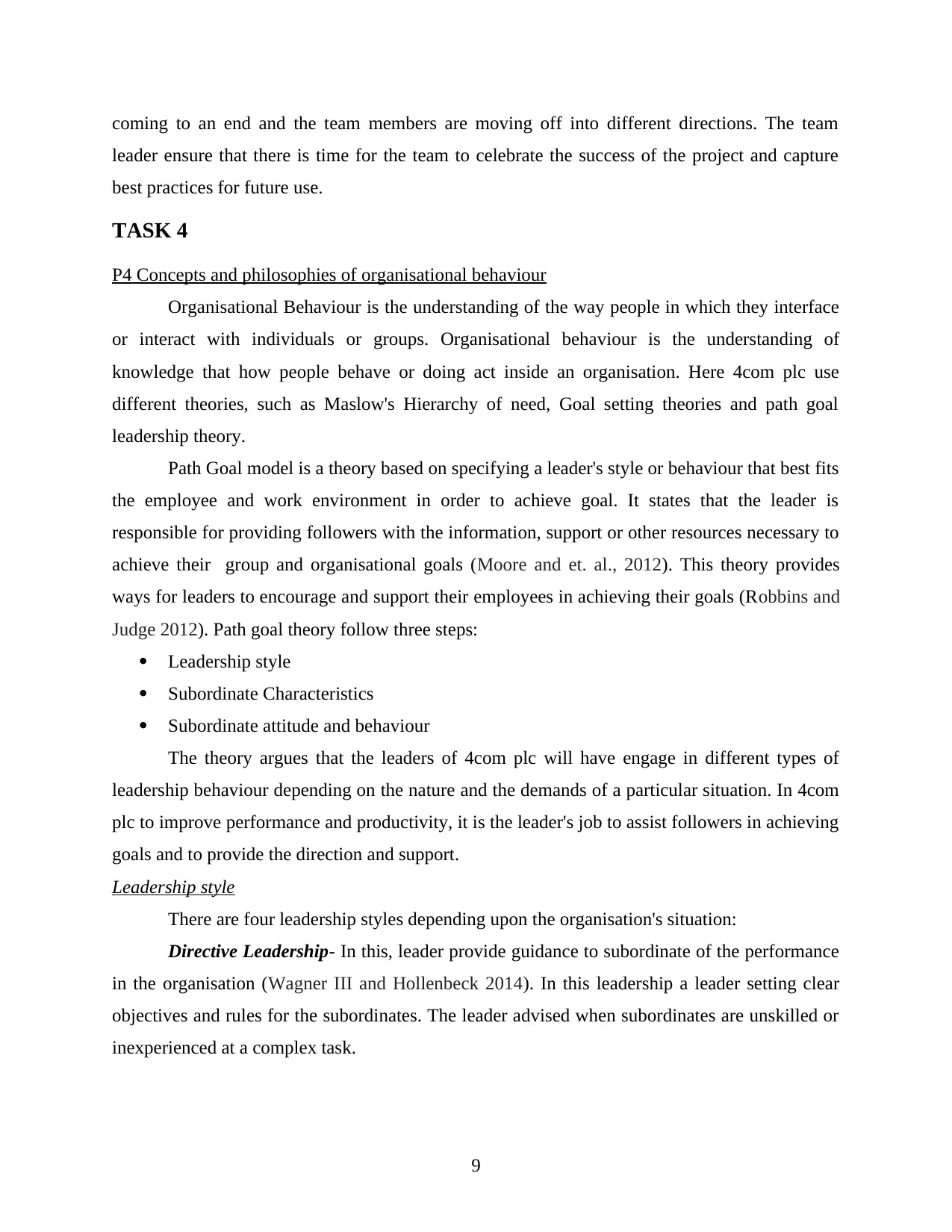
coming to an end and the team members are moving off into different directions. The team
leader ensure that there is time for the team to celebrate the success of the project and capture
best practices for future use.
TASK 4
P4 Concepts and philosophies of organisational behaviour
Organisational Behaviour is the understanding of the way people in which they interface
or interact with individuals or groups. Organisational behaviour is the understanding of
knowledge that how people behave or doing act inside an organisation. Here 4com plc use
different theories, such as Maslow's Hierarchy of need, Goal setting theories and path goal
leadership theory.
Path Goal model is a theory based on specifying a leader's style or behaviour that best fits
the employee and work environment in order to achieve goal. It states that the leader is
responsible for providing followers with the information, support or other resources necessary to
achieve their group and organisational goals (Moore and et. al., 2012). This theory provides
ways for leaders to encourage and support their employees in achieving their goals (Robbins and
Judge 2012). Path goal theory follow three steps:
Leadership style
Subordinate Characteristics
Subordinate attitude and behaviour
The theory argues that the leaders of 4com plc will have engage in different types of
leadership behaviour depending on the nature and the demands of a particular situation. In 4com
plc to improve performance and productivity, it is the leader's job to assist followers in achieving
goals and to provide the direction and support.
Leadership style
There are four leadership styles depending upon the organisation's situation:
Directive Leadership- In this, leader provide guidance to subordinate of the performance
in the organisation (Wagner III and Hollenbeck 2014). In this leadership a leader setting clear
objectives and rules for the subordinates. The leader advised when subordinates are unskilled or
inexperienced at a complex task.
9
leader ensure that there is time for the team to celebrate the success of the project and capture
best practices for future use.
TASK 4
P4 Concepts and philosophies of organisational behaviour
Organisational Behaviour is the understanding of the way people in which they interface
or interact with individuals or groups. Organisational behaviour is the understanding of
knowledge that how people behave or doing act inside an organisation. Here 4com plc use
different theories, such as Maslow's Hierarchy of need, Goal setting theories and path goal
leadership theory.
Path Goal model is a theory based on specifying a leader's style or behaviour that best fits
the employee and work environment in order to achieve goal. It states that the leader is
responsible for providing followers with the information, support or other resources necessary to
achieve their group and organisational goals (Moore and et. al., 2012). This theory provides
ways for leaders to encourage and support their employees in achieving their goals (Robbins and
Judge 2012). Path goal theory follow three steps:
Leadership style
Subordinate Characteristics
Subordinate attitude and behaviour
The theory argues that the leaders of 4com plc will have engage in different types of
leadership behaviour depending on the nature and the demands of a particular situation. In 4com
plc to improve performance and productivity, it is the leader's job to assist followers in achieving
goals and to provide the direction and support.
Leadership style
There are four leadership styles depending upon the organisation's situation:
Directive Leadership- In this, leader provide guidance to subordinate of the performance
in the organisation (Wagner III and Hollenbeck 2014). In this leadership a leader setting clear
objectives and rules for the subordinates. The leader advised when subordinates are unskilled or
inexperienced at a complex task.
9
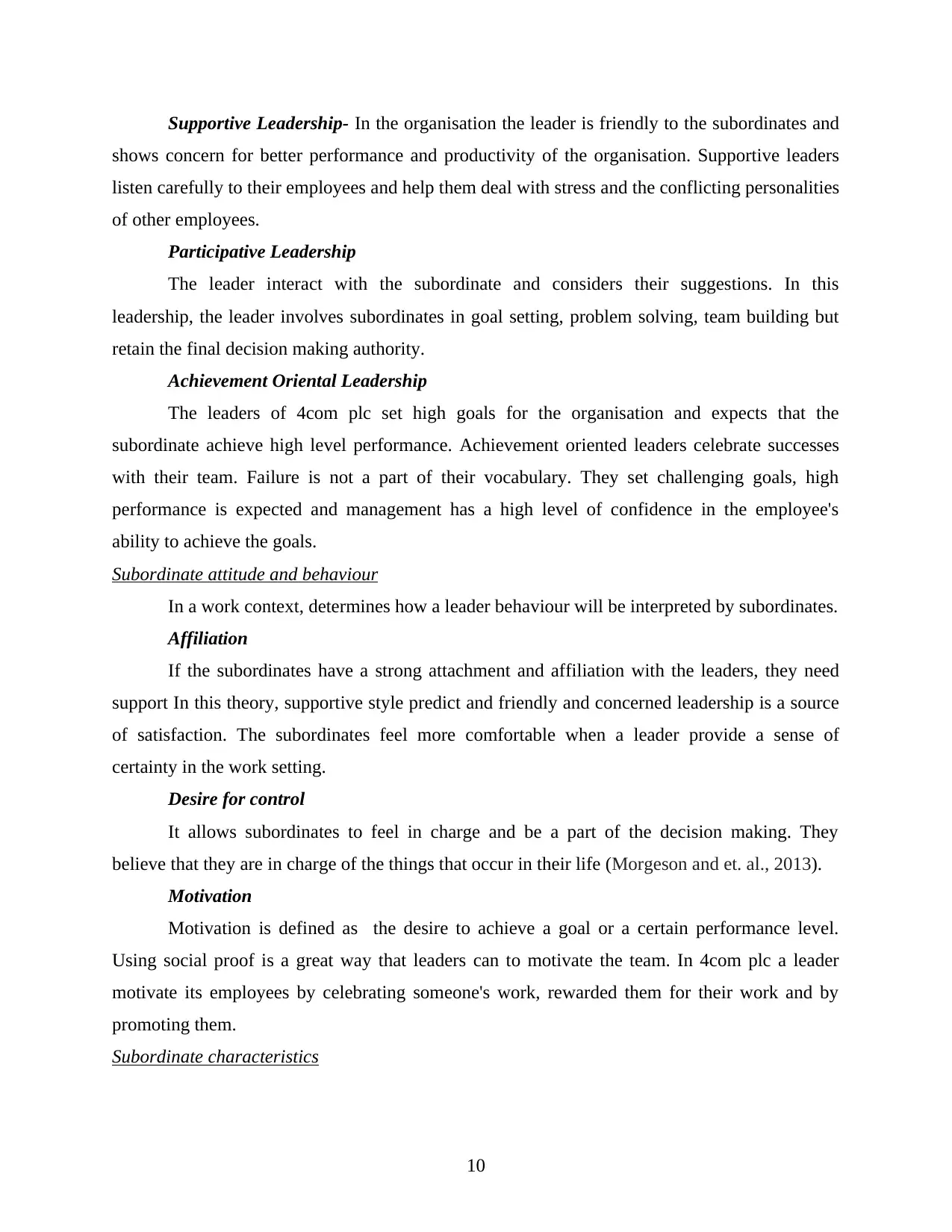
Supportive Leadership- In the organisation the leader is friendly to the subordinates and
shows concern for better performance and productivity of the organisation. Supportive leaders
listen carefully to their employees and help them deal with stress and the conflicting personalities
of other employees.
Participative Leadership
The leader interact with the subordinate and considers their suggestions. In this
leadership, the leader involves subordinates in goal setting, problem solving, team building but
retain the final decision making authority.
Achievement Oriental Leadership
The leaders of 4com plc set high goals for the organisation and expects that the
subordinate achieve high level performance. Achievement oriented leaders celebrate successes
with their team. Failure is not a part of their vocabulary. They set challenging goals, high
performance is expected and management has a high level of confidence in the employee's
ability to achieve the goals.
Subordinate attitude and behaviour
In a work context, determines how a leader behaviour will be interpreted by subordinates.
Affiliation
If the subordinates have a strong attachment and affiliation with the leaders, they need
support In this theory, supportive style predict and friendly and concerned leadership is a source
of satisfaction. The subordinates feel more comfortable when a leader provide a sense of
certainty in the work setting.
Desire for control
It allows subordinates to feel in charge and be a part of the decision making. They
believe that they are in charge of the things that occur in their life (Morgeson and et. al., 2013).
Motivation
Motivation is defined as the desire to achieve a goal or a certain performance level.
Using social proof is a great way that leaders can to motivate the team. In 4com plc a leader
motivate its employees by celebrating someone's work, rewarded them for their work and by
promoting them.
Subordinate characteristics
10
shows concern for better performance and productivity of the organisation. Supportive leaders
listen carefully to their employees and help them deal with stress and the conflicting personalities
of other employees.
Participative Leadership
The leader interact with the subordinate and considers their suggestions. In this
leadership, the leader involves subordinates in goal setting, problem solving, team building but
retain the final decision making authority.
Achievement Oriental Leadership
The leaders of 4com plc set high goals for the organisation and expects that the
subordinate achieve high level performance. Achievement oriented leaders celebrate successes
with their team. Failure is not a part of their vocabulary. They set challenging goals, high
performance is expected and management has a high level of confidence in the employee's
ability to achieve the goals.
Subordinate attitude and behaviour
In a work context, determines how a leader behaviour will be interpreted by subordinates.
Affiliation
If the subordinates have a strong attachment and affiliation with the leaders, they need
support In this theory, supportive style predict and friendly and concerned leadership is a source
of satisfaction. The subordinates feel more comfortable when a leader provide a sense of
certainty in the work setting.
Desire for control
It allows subordinates to feel in charge and be a part of the decision making. They
believe that they are in charge of the things that occur in their life (Morgeson and et. al., 2013).
Motivation
Motivation is defined as the desire to achieve a goal or a certain performance level.
Using social proof is a great way that leaders can to motivate the team. In 4com plc a leader
motivate its employees by celebrating someone's work, rewarded them for their work and by
promoting them.
Subordinate characteristics
10
⊘ This is a preview!⊘
Do you want full access?
Subscribe today to unlock all pages.

Trusted by 1+ million students worldwide
1 out of 16
Related Documents
Your All-in-One AI-Powered Toolkit for Academic Success.
+13062052269
info@desklib.com
Available 24*7 on WhatsApp / Email
![[object Object]](/_next/static/media/star-bottom.7253800d.svg)
Unlock your academic potential
Copyright © 2020–2025 A2Z Services. All Rights Reserved. Developed and managed by ZUCOL.





